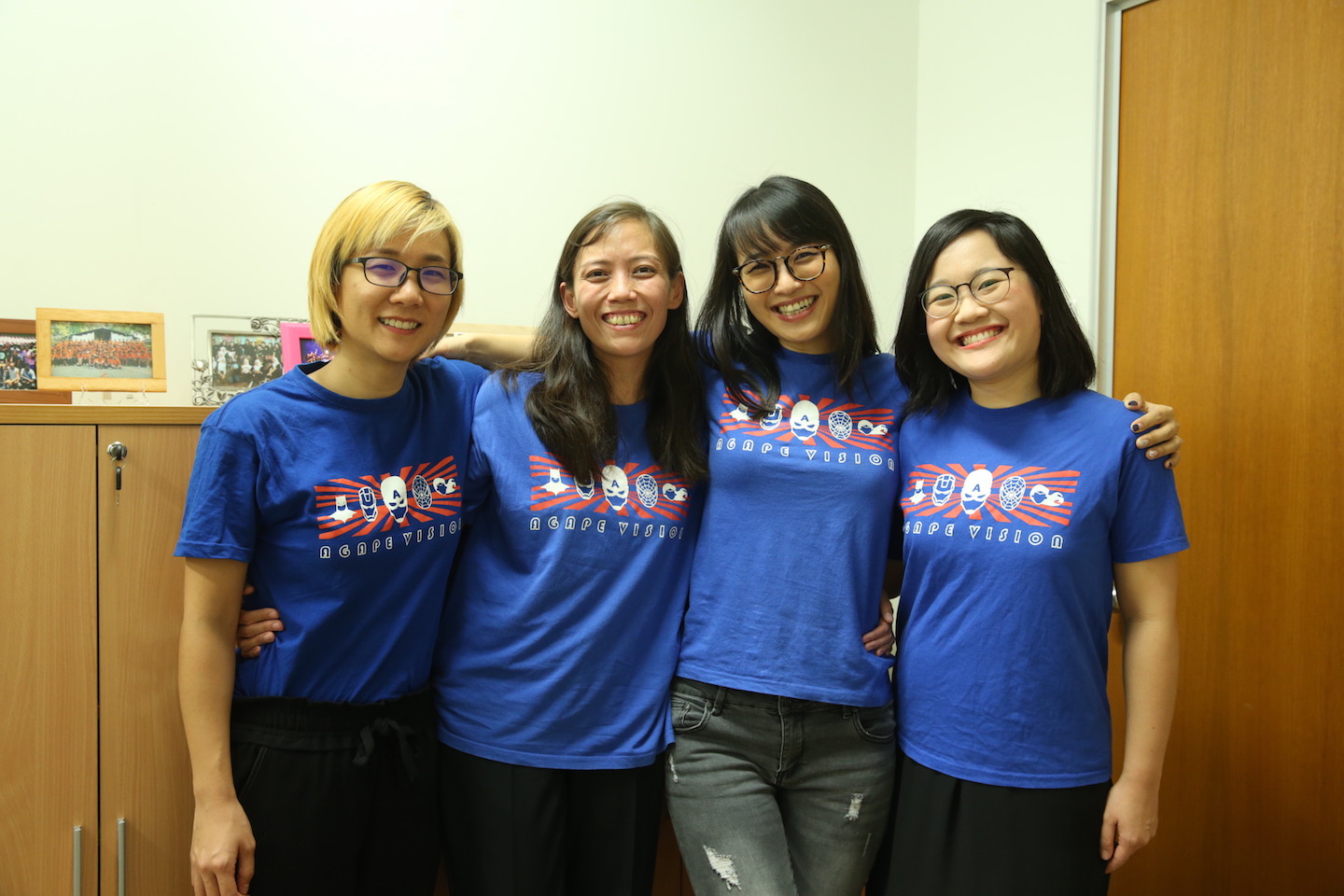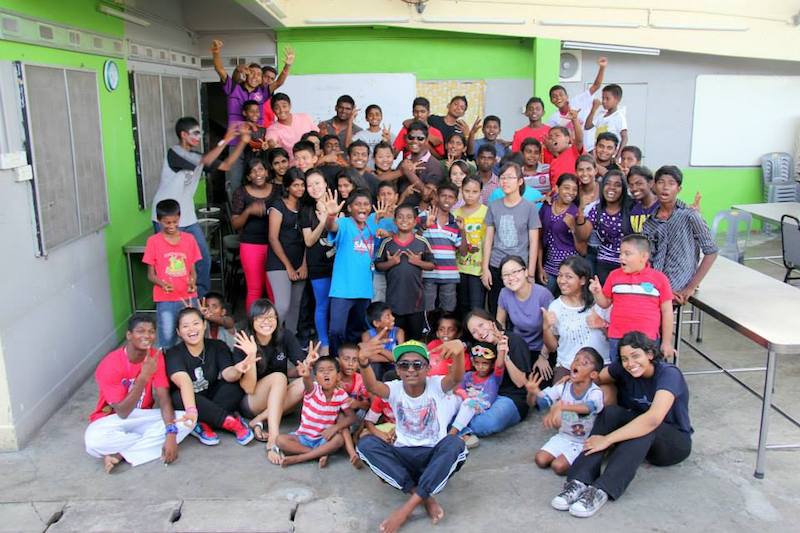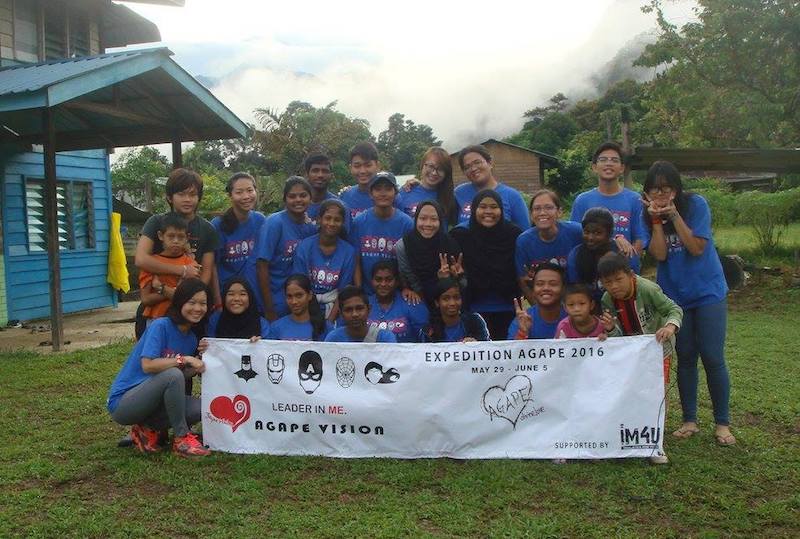
From left: Lim Sue-Anne, Gillian Chong, Avis Ng and Melody Leong Mei-San (Photo: Sam Fong/The Edge)
Agape, Greek for unconditional love, aptly portrays the foundation that Agape Vision — a volunteer-run society that reaches out to at-risk, abused and marginalised youths — is built upon. Established in 2010 and officially registered as a society two years later, it was birthed from the dream of co-founder and president Gillian Chong of giving sexually abused children a voice and, subsequently, supporting their journey to healing from the trauma of the harrowing incident.
Agape Vision volunteers have since supported around 200 youths from shelter homes or who live with family. They are referred to the society by NGOs such as Shelter Home for Children, Rumah Hope, Friends of Kota Damansara and Yayasan Chow Kit, with whom Agape Vision closely works. The society’s role is to assist the youths in processing the abuse they have suffered and letting go of defences and hurtful behaviours arising from the abuse, helping them feel safe and honing the skills required for their future.
Considering the delicate nature of the issues dealt with and as a safety precaution, it is a requirement that a new volunteer must be someone an existing volunteer has known for at least a year. The society is also particular about the longevity of the programmes, which focus on long-term impact. “It takes about two years to build a relationship of trust with the youths and for them to open up to us … To achieve this, we need to be transparent and share our struggles and experiences as well,” says co-founder Avis Ng, a qualified counsellor.

Chong comes from an audit background, but her calling to help at-risk youth led her to pursue counselling. Today, she and Lim Sue-Anne — who was a tax consultant with EY prior to pursuing a master’s in counselling — handle the individual and group counselling cases while Ng is the designated family counsellor. Another core member is Melody Leong Mei-San, the policymaker for the society as well as watching brief lawyer. Together, they work towards providing a safe haven for at-risk youth who may suffer in silence without the necessary support and, in extreme situations, may contemplate suicide.
“The needs of at-risk youths transcend basic necessities such as food, shelter and schooling ... This is where we come in to provide the youth with soft skills,” Ng says. Sadly, for youths living in shelters, budgeting constraints can affect the quality of the staff hired and, in some cases, even perpetuate abuse. Similarly, those with a poor socioeconomic background are often afforded little attention and care. Leong believes early intervention is key and that “it is a shared responsibility among anyone in contact with a child to alert the authorities”.
The annual Expedition Agape Malaysia is its flagship programme. This year, it took place in Cambodia, where youths interacted with children from a school in the slums to paint murals and the classrooms. According to Leong, “youths from [shelter] homes may be accustomed to always receiving donations and struggle with life skills upon leaving”. The expedition encourages them to develop and implement a community service project that positively contributes to underprivileged individuals. It instils awareness, empathy and a realisation that they can make a difference in the lives of others.

Programme @dulting, meanwhile, seeks to hone skills ranging from financial management, job hunting and résumé writing to everyday activities such as using an ATM.
Leong, who is a lawyer and a member of the Malaysian Bar Child Rights Committee, cites the implementation of child protection policies as an issue requiring immediate attention. “Our priority is removing the child into safe care … Under the new Sexual Offences Against Children Act, there is a mandatory obligation for everyone to report. But when we attempted to lodge a report, it wasn’t accepted due to the child being absent … Procedure-wise, it was not handled properly,” she says, recalling an incident involving a youth who had disclosed prolonged sexual abuse. The team has also seen complaints dismissed as exam stress or “acting up” despite physical and behavioural evidence of distress.
In terms of a child protection framework, the team concurs that Singapore is a good example to emulate. Agape Vision’s soon-to-be-completed Residential Treatment Centre is based on that of the city-state. Chong spent eight months there — the first-of-its-kind in the region — learning the ropes. Once up and running, the Malaysia centre will provide a caring, safe and structured group home environment for youths who have suffered the trauma of childhood abuse and offer a progressive treatment programme with the goal of successful reintegration into their families.
Despite the challenges faced, seeing the ripple effect of their work motivates the team to keep going. “Reform must take place and we, as NGOs, want to support the authorities in doing their work. There needs to be a change of mindset to see this as a partnership instead of interference,” Leong stresses. In the meantime, Agape Vision will continue its work with at-risk youth while looking forward to some much-needed change in child protection.
This article first appeared on Oct 22, 2018 in The Edge Malaysia.


